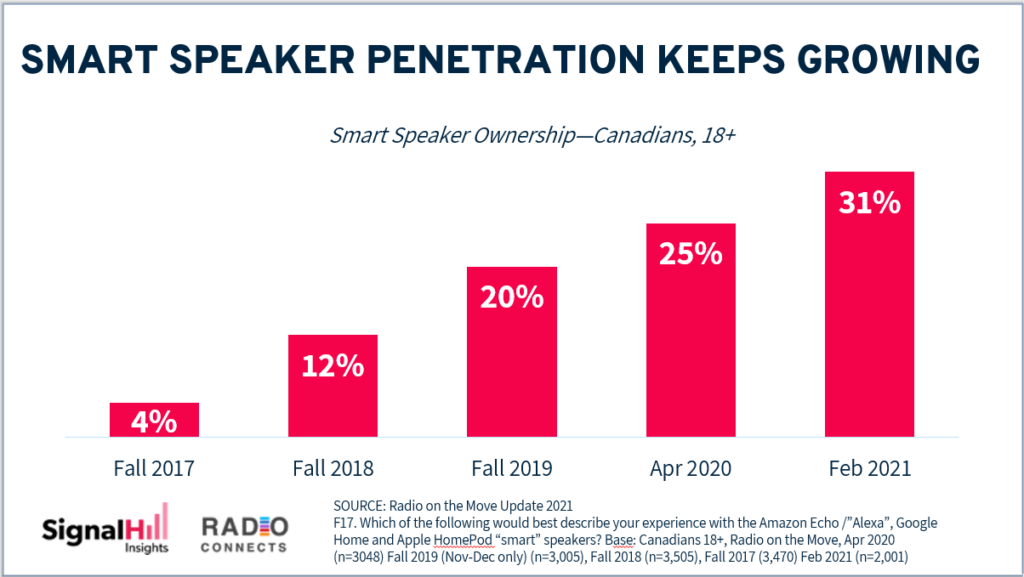I have a confession. I’m a two-finger typist. When I got my first elective in middle school, the choice was typing or Latin. I went for Latin. Bad call.
When I landed my first job writing radio ads, there was no time for remedial learning. I survived by clumsily bashing my two fingers into the keys as fast as those two fingers would allow. Ever since, including the daily encounters with my laptop, my keyboard has stood stubbornly between me and what I want to get done.
This naturally attracts me to the idea of instant voice access to all the things technology has to offer. And of course, it’s something we watch with the audio research we do at Signal Hill Insights.
Voice recognition technology has come a long way. Smart speakers from Amazon and Google and digital voice assistants (Alexa, Siri, Cortana, Samsung’s Bixby and the Google Assistant) have taken us to the brink of a new future—a future where we can set the keyboard aside and get what we need from technology just by asking.
Consumers are starting to catch on. In our recent Radio on the Move study from February of this year:
- Nearly one-third (31%) of all adult Canadians say they have a Google, Amazon or Apple smart speaker in their home.

- Even more Canadians (35%) say they use other voice-activated digital assistants that they access through their phone or computer, including more than half (51%) of all 18-34 year-olds.
The implications are stunning.
Meet Dr. Teri Fisher, a sport and exercise physician from Vancouver who doubles as a voice tech evangelist. Here are two quotes from Teri that lay out the new rules of engagement:
- “We no longer are adapting to computers; computers are adapting to us.”
- “Voice is becoming the next operating system, the ‘vOS’.”
Looking ahead, it’s easy to imagine the next generation being ‘voice natives’ in the same way we consider Generation Z to be ‘digital natives.’ Young kids today are using voice to activate technology before they read and write. Will they stay voice-first as they grow up? You have to think so.
The potential for brands—and those of us working in audio—are exciting. Voice tech opens up new kinds of conversations with customers. Instead of typing their way to a brand’s website, consumers can instantly connect with their brands using voice.
In turn, audio design could become as important as web design for many brands. Brands don’t want to rely on Alexa being their voice. They want to deliver their own voice and an audio experience that best reflects their brand architecture.
The voice tech movement extends beyond smart speakers and digital assistants. Over the past couple of years, Pandora and Spotify as well as Amazon have been engaging brands with beta versions of voice interactive ad campaigns. Pandora reported little pushback from the listeners in their initial testing, with most agreeing they found it easy to interact with the ads they heard.
Like most new technologies, all this won’t happen overnight. The artificial intelligence necessary to drive seamless voice interaction is in its early stages. Likewise, setting up the Alexa “Skills” and Google “Actions” required for brands to interact with their customers can still be cumbersome. And there are real privacy concerns. Though down slightly in the past year, nearly two-thirds of adult Canadians in the February Radio on the Move Update were very or somewhat concerned about privacy by having a smart speaker their home.
That said, so long as new cases are developed (and privacy concerns are addressed), we can expect that voice and audio will play a big part of our future—and keyboards, thankfully for me at least, will play a much smaller part.
If you are interested in following what’s happening in voice tech and how the wider world of audio fits into all this, you should check out Teri Fisher. He writes blogs and leads discussions with leading voice tech and audio experts. Thanks to Jodi Krangle who turned me on to Teri’s work and whose excellent Audio Branding podcast explores a lot of the same turf from a brand perspective.
Or maybe you just want to talk audio and audio research? Drop me a line here or connect with us at Signal Hill Insights.
